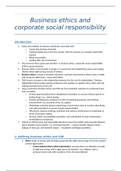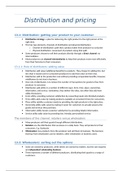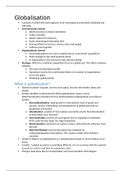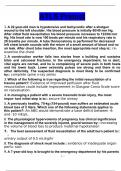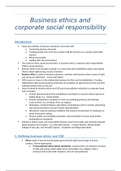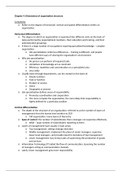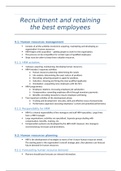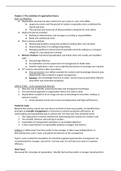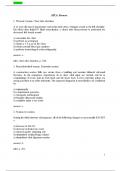Business ethics and
corporate social responsibility
Introduction
Goals and activities of business should be concerned with:
o Conducting business honestly
o Treating people who come into contact with the business in a socially responsible
manner
o Being accountable.
o Looking after the environment
The name for these ‘goals and activities’ is: business ethics, corporate social responsibility
(CSR) or green business.
Business ethics is the broader concept: it is concerned with establishing values and making
choices about right/wrong courses of actions.
Business ethics: a study of business situations, activities and decisions where issues of right
and wrong are addressed – Crane and Matten
CSR focuses on issues in the relationship between the firm and its stakeholders. Treating
stakeholders fairly involves paying employees and suppliers as agreed and on time and only
making promises that can be met.
Issues covered by business ethics and CSR vary from pollution reduction to corporate fraud
and corruption.
o In R&D: pharmaceutical firms established committees to oversee ethical aspects of
testing drugs. E.g. animal testing
o Product development: emphasis on safe non-polluting products and working
environments. E.g. emissions from car engines
o Marketing: restricted tobacco advertising. Commissions exist to monitor advertising
and sales promotions to ensure honest representation
o HR policies: improve working conditions and enhance involvement of employees in
terms of decision making
o Finance: public accountability standards, and contribution to local communities
(multinational companies)
Interest in ethical issues and responsible business comes from public and corporate disquiet
about disasters and scandals. E.g. Chernobyl disaster – nuclear disaster, Bhopal (India) –
leakage of toxic gas, and Yamaichi (Japan) – fraudulent and illegal operations.
1: Defining business ethics and CSR
Ethics: study of morals and principles governing the rights and wrongs of human conduct.
Several approaches:
o Transcendental ethics/ethical absolutism: assumes there are absolute concepts
of right and wrong, which apply across all societies. E.g. religions claim a
universal moral code with variations: form of transcendental
, o Utilitarianism: pragmatic approach to transcendental ethics. Argues that an
action is morally right if it produces the greatest good for the greatest number of
people
o Ethical relativism/social ethics: ethical standards will vary between societies,
reflecting their histories and influences. E.g. death penalty in some countries, but
not in others. Multinationals operate in countries with different cultures, laws
and institutions, and there are few universals: strong link with globalisation
o Tactical ethics: assumes people pursue ethical standards because it suits them to
do so. Businesses produce codes of practice and corporate statements identifying
ethical intentions.
1.1: Business ethics
Concerned with moral issues and individual choices of right/wrong and values of what is
good/bad within the conduct of business affairs.
Many complexities with globalisation:
o Within business, widespread beliefs about how customers/employees should be
treated. Approach used is one of ethical relativism. Standards in business are a
function of:
Values of individuals working in an organisation
Corporate culture created by top management
Codes of conduct operating in individual organisations
Social norms of the society of the organisation
Prevailing laws: vary between countries.
o Values vary across societies. This is difficult where e.g. bribing is allowed in one
country, and an employee in that country has to do business with another
employee in a country where this is not allowed.
o Transparency International has been established as an independent global
watchdog on bribery and corruption. It publishes reports to indicate corruption
indexes across the world.
o Standards change over time. E.g. UK is now against child labour, however, it was
common in mining/textile industries of the 19 th century.
1.2: Corporate social responsibility
Highlights ethical issues in business by defining those activities and those groups to
whom the company and its representatives are responsible, and those areas for which
responsibility is taken.
“a situation where the firm goes beyond compliance and engages in actions that appear
to further some social good beyond the interests of the firm and which is required by the
law” – McWilliams.
1.3: Areas of activity in CSR
Areas of CSR:
o Business ethics
o Legal compliance
o Philanthropy and community investment
o Environmental management
o Sustainability
o Animal rights
o Human rights
o Employee rights/welfare
corporate social responsibility
Introduction
Goals and activities of business should be concerned with:
o Conducting business honestly
o Treating people who come into contact with the business in a socially responsible
manner
o Being accountable.
o Looking after the environment
The name for these ‘goals and activities’ is: business ethics, corporate social responsibility
(CSR) or green business.
Business ethics is the broader concept: it is concerned with establishing values and making
choices about right/wrong courses of actions.
Business ethics: a study of business situations, activities and decisions where issues of right
and wrong are addressed – Crane and Matten
CSR focuses on issues in the relationship between the firm and its stakeholders. Treating
stakeholders fairly involves paying employees and suppliers as agreed and on time and only
making promises that can be met.
Issues covered by business ethics and CSR vary from pollution reduction to corporate fraud
and corruption.
o In R&D: pharmaceutical firms established committees to oversee ethical aspects of
testing drugs. E.g. animal testing
o Product development: emphasis on safe non-polluting products and working
environments. E.g. emissions from car engines
o Marketing: restricted tobacco advertising. Commissions exist to monitor advertising
and sales promotions to ensure honest representation
o HR policies: improve working conditions and enhance involvement of employees in
terms of decision making
o Finance: public accountability standards, and contribution to local communities
(multinational companies)
Interest in ethical issues and responsible business comes from public and corporate disquiet
about disasters and scandals. E.g. Chernobyl disaster – nuclear disaster, Bhopal (India) –
leakage of toxic gas, and Yamaichi (Japan) – fraudulent and illegal operations.
1: Defining business ethics and CSR
Ethics: study of morals and principles governing the rights and wrongs of human conduct.
Several approaches:
o Transcendental ethics/ethical absolutism: assumes there are absolute concepts
of right and wrong, which apply across all societies. E.g. religions claim a
universal moral code with variations: form of transcendental
, o Utilitarianism: pragmatic approach to transcendental ethics. Argues that an
action is morally right if it produces the greatest good for the greatest number of
people
o Ethical relativism/social ethics: ethical standards will vary between societies,
reflecting their histories and influences. E.g. death penalty in some countries, but
not in others. Multinationals operate in countries with different cultures, laws
and institutions, and there are few universals: strong link with globalisation
o Tactical ethics: assumes people pursue ethical standards because it suits them to
do so. Businesses produce codes of practice and corporate statements identifying
ethical intentions.
1.1: Business ethics
Concerned with moral issues and individual choices of right/wrong and values of what is
good/bad within the conduct of business affairs.
Many complexities with globalisation:
o Within business, widespread beliefs about how customers/employees should be
treated. Approach used is one of ethical relativism. Standards in business are a
function of:
Values of individuals working in an organisation
Corporate culture created by top management
Codes of conduct operating in individual organisations
Social norms of the society of the organisation
Prevailing laws: vary between countries.
o Values vary across societies. This is difficult where e.g. bribing is allowed in one
country, and an employee in that country has to do business with another
employee in a country where this is not allowed.
o Transparency International has been established as an independent global
watchdog on bribery and corruption. It publishes reports to indicate corruption
indexes across the world.
o Standards change over time. E.g. UK is now against child labour, however, it was
common in mining/textile industries of the 19 th century.
1.2: Corporate social responsibility
Highlights ethical issues in business by defining those activities and those groups to
whom the company and its representatives are responsible, and those areas for which
responsibility is taken.
“a situation where the firm goes beyond compliance and engages in actions that appear
to further some social good beyond the interests of the firm and which is required by the
law” – McWilliams.
1.3: Areas of activity in CSR
Areas of CSR:
o Business ethics
o Legal compliance
o Philanthropy and community investment
o Environmental management
o Sustainability
o Animal rights
o Human rights
o Employee rights/welfare

